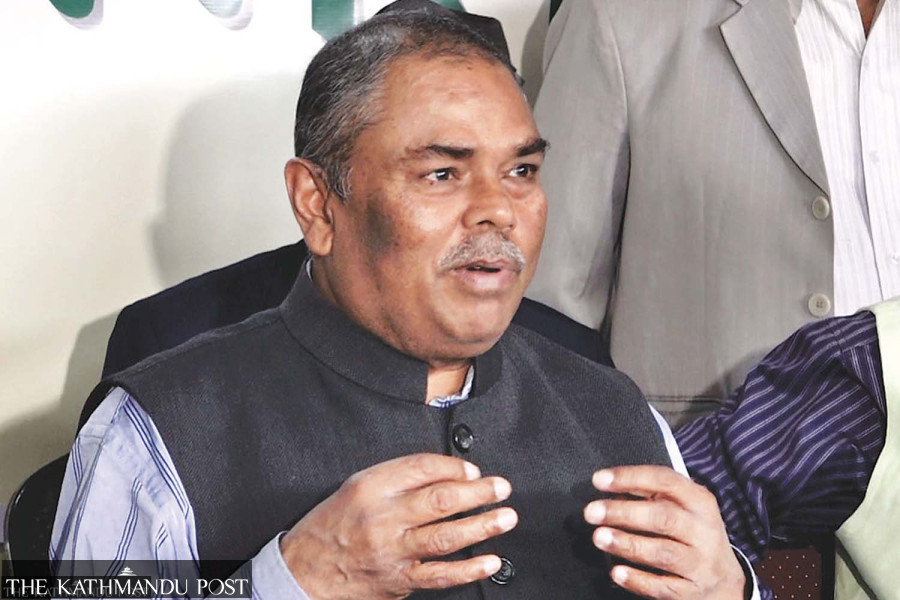Politics
Upendra Yadav’s party to back constitution revision, with conditions
Analyst blasts Janata Samajbadi Party-Nepal for recycling old agenda, accuses Yadav of betraying Madheshi people.
Purushottam Poudel
When the political parties in the House of Representatives appear divided over the idea of amending the constitution, vaguely floated by the Nepali Congress and the CPN-UML, the Janata Samajbadi Party-Nepal (JSP-Nepal), has said it would welcome it provided the party’s demands are addressed.
KP Sharma Oli became prime minister based on a July 1 agreement reached between the Congress and the UML. In the same deal, the two largest parties also agreed to take turns to head the government and amend the constitution, purportedly to ensure political stability, among other things.
“The national consensus government will prioritise reviewing the strengths, weaknesses, and complications observed in implementing the constitution and will focus on amending the constitution and enacting related laws to ensure political stability,” Prime Minister Oli stated in Parliament on July 21, during his floor test.
Some parties, including the CPN (Maoist Centre), the third largest party in the House of Representatives, have raised serious concerns about the intentions behind the proposed amendments, accusing the big parties of attempting to revoke some progressive features of the statute.
Maoist Centre chair Pushpa Kamal Dahal was ousted from the position of prime minister on July 12 after the two largest parties joined hands to form a government.
The Rastriya Swatantra Party, the fourth largest in the lower house, has also questioned the motives behind the Congress-UML deal. The JSP-Nepal, however, is comparatively more open to the idea of revising the constitution.
The party has demanded that its certain concerns must be addressed should there be any amendments to the statute. The party has called for the formation of a constitutional review commission comprised of experts to propose amendments.
The party’s central committee meeting held from August 11 to 14 decided to support amendments based on the recommendations of an elite commission.
The party has also demanded amending the constitution to place local units under the provincial government. Likewise, it has demanded a directly elected executive head, a fully proportional election system, a federal justice system with proportional and inclusive representation, and self-governance based on national and ethnic identity. Yadav, who led a different political party, had submitted these proposals in the Constituent Assembly while drafting the statute as well.
“The names of provinces should reflect their identities,” mentions the decision of the party’s central committee meeting.
Many of JSP-Nepal’s demands related to amendments echo Yadav’s previous positions. Although the party had compromised on its demands during the constitution-making process for consensus, it is now advocating for a directly elected executive head, among other things.
“Most of our current demands are the same ones that we had registered during the constitution-drafting process,” Prakash Adhikari, a party leader and a federal lawmaker from the party, told the Post. “If the two major parties address our demands, we are open to revising the constitution.”
But Chandrakishore, a political analyst from Madhesh, finds the JSP-Nepal’s demands as irrelevant. Except for the directly elected executive head, the issues the party now has raised are old ones, he told the Post.
“The party’s latest demands are the issues of the Madhesh Movement, but Yadav then chose to align with the ruling parties and betrayed the movement,” Chandrakishore told the Post. “Now he is again raising the same old issues in an attempt to placate the Madheshi people.”
“If JSP-Nepal wants to truly engage with the people, it needs a leadership overhaul. Repeating past demands won’t work.”
Despite lending support to Prime Minister Oli during the trust vote, the party was not accommodated in the Cabinet, while its splinter faction, the Janata Samajbadi Party holds a key portfolio in the Oli government.
After Ashok Rai, then federal chair of the party, along with six lawmakers, split the party on May 5 to form the Janata Samajbadi Party, the JSP-Nepal’s strength in the House has diminished markedly.
The party concluded its general convention in June unanimously electing Yadav as party chair.
Even after over two months of the convention, the party is still to elect its office bearers, though it has formed a central executive council.
A party’s central committee meeting last week demanded that the parliamentary and provincial constituencies be redrawn based on the latest census. Likewise, the party has also called for proportional representation in the National Assembly.
Similarly, the party also vows to dissolve District Coordination Committees, arguing they are redundant under the federal structure.




 8.79°C Kathmandu
8.79°C Kathmandu














